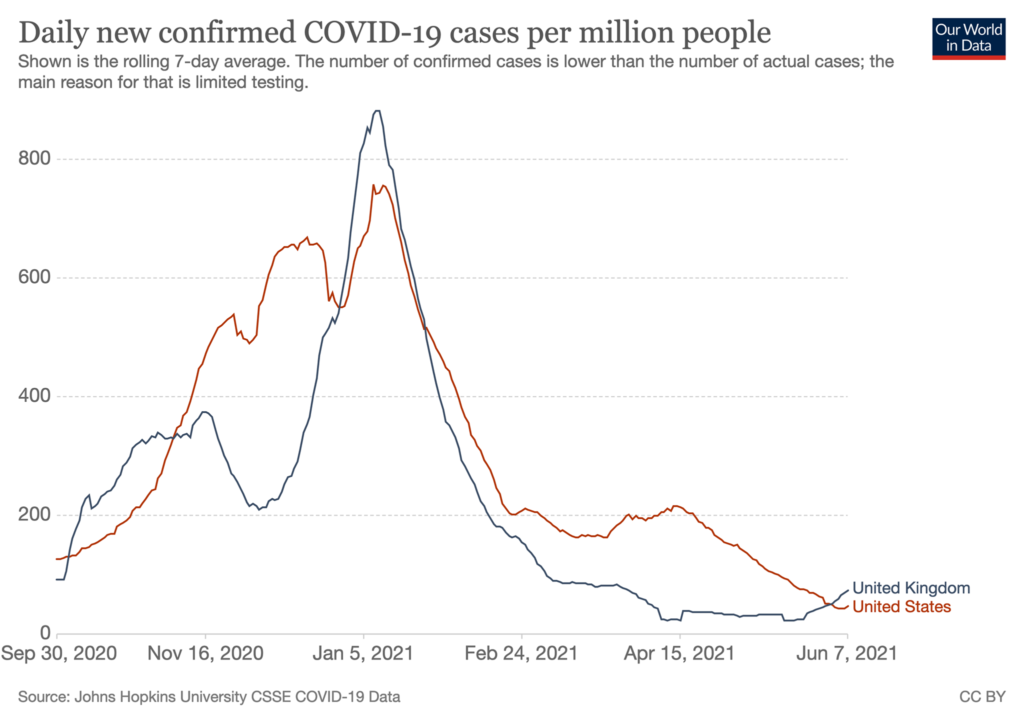A: Cases are rising quickly, possibly due to the variant formerly known as B.1617.2
➡️ The Delta variant MAY be more transmissible and cause more severe infection, but the jury is still out.
↗️ The steep rise in cases in the U.K. in December and January was fueled by what was then known as the UK or B.1.1.7 variant, now known as “Alpha.”
⬇️ After a multi-month lockdown coupled with surging vaccinations, cases in the UK reached very low levels by April when restrictions gradually began being lifted.
↗️ In the past few weeks, cases have started rising…exponentially 😱, with cases up over 60% in the last 7 days. Hospitalizations have also started to edge up again, but deaths so far remain low 🙏.
➡️ The Delta variant is now the dominant one in the UK, with Alpha becoming less prevalent.
This crowding out of the Alpha variant by Delta suggests it *might* be more transmissible. Public Health England (PHE) estimates that the “secondary attack rate,” or how many contacts of an infected person also become infected, is 50% higher for the Delta compared to Alpha variant.
Early evidence from Scotland and England suggests that Delta MAY be associated with about a 2.6 X greater risk of hospitalization for those infected.
⚠️ While these numbers are concerning, they should also be taken with caution until we have more data. Viruses and variants have intrinsic properties, but so do their hosts.
🎲 Especially when cases are starting from a low base, chance has a lot to do with who gets infected early on. For example, a traveler could bring a variant back into a specific neighborhood. If the housing density in that neighborhood makes it easier to pass on the virus, this could make it look like increased transmissibility of the new variant, when the real cause is the living arrangements of those who first got infected.
As we collect data from more settings, we’ll be able to see if these early findings are a fluke or real properties of the Delta variant.
❓DO THE VACCINES WORK AGAISNT DELTA❓
💥 YES, but two doses appear even more important than before.
The estimated effectiveness of the vaccines against symptomatic infection with Delta compared to Alpha is reduced after one dose of both the Pfizer/BioNTech and Astrazeneca vaccines, but remained strong after two doses.
💥 There is also evidence from hospitalizations that the vaccines remain highly effective.
According to UK Health Secretary Matt Hancock, of the 126 Delta variant cases in hospitals across England, only 3 people had received both doses of a vaccine, while 28 had been given a single dose. This means the vast majority of hospitalized cases were in unvaccinated people.
![]() Currently 77% of the *adult* population in the UK has received at least one dose, with 53.7% fully vaccinated. While this is great progress, the race between the vaccines and variant is still on, putting pressure on the government’s planned full re-opening on June 21st.
Currently 77% of the *adult* population in the UK has received at least one dose, with 53.7% fully vaccinated. While this is great progress, the race between the vaccines and variant is still on, putting pressure on the government’s planned full re-opening on June 21st.
BOTTOM LINE:
➡️ The new Delta variant may be more transmissible, and cases are rising rapidly as the UK opens up.
➡️ So far vaccine effectiveness against Delta looks lower for one dose, but strong for two doses.
➡️ Vaccines are weakening the link between cases and hospitalizations & deaths, exactly as we hoped.
Stay Safe, Stay Sane, and don’t forget that 2nd dose!
Love,
Those Nerdy Girls
Further Reading:
How serious is Delta Covid variant for UK and do vaccines stop it?
Recent post on renaming of the variants.
UK case, hospitalization, and deaths summary
Public Health England variant technical reports:
Investigation of SARS-CoV-2 variants of concern: technical briefings
Investigation of SARS-CoV-2 variants of concern: variant risk assessments



